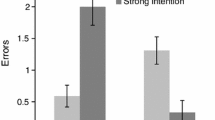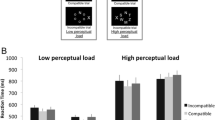Abstract
In two experiments, we investigated the effect of regulatory focus (Higgins, Am Psychol, 52, 1280–1300, 1997) on people’s maintenance and switching behavior. In the experimental tasks, participants were asked to react selectively to one category of stimuli while ignoring the other. After several practice trials, participants had to switch either to new stimuli which were paired with former target stimuli (i.e., in the perseveration condition), or switch to former distracter stimuli which were paired with new stimuli (i.e., in the learned irrelevance condition). Results from both experiments indicated that a promotion focus promoted switching to new stimuli in the perseveration condition, at the cost of poorer performance on switching to former distracters in the learned irrelevance condition. This pattern of results applied to both chronic individual differences in regulatory focus (Experiment 1), and regulatory focus temporarily manipulated in the laboratory (Experiment 2). It suggests that whereas a promotion focus indeed promotes cognitive flexibility, it also incurs a cost in terms of increased likelihood of being distracted.


Similar content being viewed by others
References
Baas, M., de Dreu, C. K. W., & Nijstad, B. A. (2011). When prevention promotes creativity: the role of mood, regulatory focus, and regulatory closure. Journal of Personality and Social Psychology, 100, 794–809.
Biss, R. K., & Hasher, L. (2011). Delighted and distracted: positive affect increases priming for irrelevant information. Emotion, 11, 1474–1478.
Brockner, J., Paruchuri, S., Idson, L. C., & Higgins, E. T. (2002). Regulatory focus and the probability estimates of conjunctive and disjunctive events. Organizational behavior and human decision processes, 87, 5–24.
Chiew, K. S., & Braver, T. S. (2011). Positive affect versus reward: emotional and motivational influences on cognitive control. Frontiers in Psychology, 2, 1–10.
Crowe, E., & Higgins, E. T. (1997). Regulatory focus and strategic inclinations: promotion ad prevention in decision-making. Organizational Behavior and Human Decision Processes, 69, 117–132.
De Lange, M. A., & van Knippenberg, A. (2007). Going against the grain: regulatory focus and interference by task-irrelevant information. Experimental Psychology, 54, 6–13.
Dreisbach, G., & Goschke, T. (2004). How positive affect modulates cognitive control: reduced perseveration at the cost of increased distractibility. Journal of Experimental Psychology: Learning, Memory, and Cognition, 30, 343–353.
Eddington, K. M., Dolcos, F., Cabeza, R., Krishnan, K. R. R., & Strauman, T. J. (2007). Neural correlates of promotion and prevention goal activation: an fMRI study using an Idiographic approach. Journal of Cognitive Neuroscience, 19, 1152–1162.
Freitas, A. L., Liberman, N., Salovery, P., & Higgins, E. T. (2002). When to begin? Regulatory focus and initiating goal pursuit. Personality and Social Psychology Bulletin, 28, 121–130.
Friedman, R. S., & Förster, J. (2001). The effects of promotion and prevention cues on creativity. Journal of Personality and Social Psychology, 81, 1001–1013.
Higgins, E. T. (1997). Beyond pleasure and pain. American Psychologist, 52, 1280–1300.
Higgins, E. T., Friedman, R. S., Harlow, R. E., Idson, L. C., Ayduk, O. N., & Taylor, A. (2001). Achievement orientations from subjective histories of success: promotion pride versus prevention pride. European Journal of Social Psychology, 31, 2–23.
Liberman, N., Idson, L. C., Camacho, C. J., & Higgins, E. T. (1999). Promotion and prevention choices between stability and change. Journal of Personality and Social Psychology, 77, 1135–1145.
Liberman, N., Molden, D. C., Idson, L. C., & Higgins, E. T. (2001). Promotion and prevention focus on alternative hypotheses: implications for attributional functions. Journal of Personality and Social Psychology, 80, 5–18.
Markman, A. B., Baldwin, G. C., & Maddox, W. T. (2005). The interaction of payoff structure and regulatory focus in classification. Psychological Science, 16, 852–855.
Mayr, U., & Keele, S. W. (2000). Changing internal constraints on action: the role of backward inhibition. Journal of Experimental Psychology: General, 129, 4–26.
Monsell, S., Sumner, P., & Waters, H. (2003). Task-set reconfiguration with predictable and unpredictable task switches. Memory and Cognition, 31, 327–342.
Müller, H. J., Geyer, T., Zehetleitner, M., & Krummenacher, J. (2009). Attentional capture by salient color singleton distractors is modulated by top-down dimensional set. Journal of Experimental Psychology: Human Perception and Performance, 35, 1–16.
O’Reilly, R. C., Braver, T. S., & Cohen, J. D. (1999). A biologically-based computational model of working memory. In A. Miyake & P. Shah (Eds.), Models of working memory: executive control (pp. 375–411). New York: Cambridge University Press.
Shah, J., Higgins, E. T., & Friedman, R. S. (1998). Performance incentives and means: how regulatory focus influences goal attainment. Journal of Personality and Social Psychology, 74, 285–293.
Shah, J., & Higgins, E. T. (2001). Regulatory concerns and appraisal efficiency: The general impact of promotion an prevention. Journal of Personality and Social Psychology, 80, 693–705.
Author information
Authors and Affiliations
Corresponding author
Rights and permissions
About this article
Cite this article
Zhang, H., Chan, D.KS. Regulatory focus influences perseveration and distractibility in task switching. Psychological Research 77, 808–817 (2013). https://doi.org/10.1007/s00426-012-0469-1
Received:
Accepted:
Published:
Issue Date:
DOI: https://doi.org/10.1007/s00426-012-0469-1




